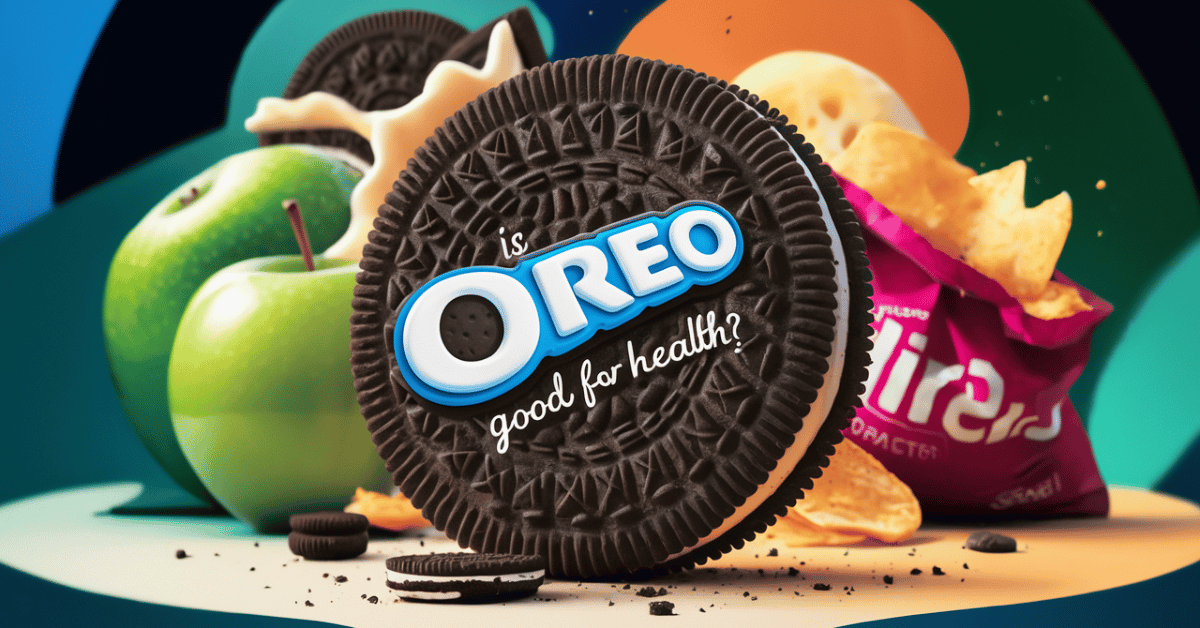Beyond the Black and White: Oreo’s Health Benefits vs. Drawbacks
Oreo’s. The iconic black and white cookie has been a beloved treat for generations, dipped in milk or enjoyed on its own. But are these popular cookies friend or foe when it comes to your health? Let’s delve deeper and explore the benefits and drawbacks of Oreo’s.


Oreo Biscuit Good for Health?
There’s no simple answer. Oreo’s offer minimal health benefits and contain ingredients that can be detrimental to your health if consumed excessively.
Potential Benefits (Limited):
Quick Energy Source: Oreo’s provide carbohydrates, which can offer a quick energy boost. However, this energy is short-lived due to the high sugar content.
Small Source of Some Nutrients: Oreo’s contain trace amounts of calcium, iron, and vitamin D due to the milk used in their production. However, healthier sources offer these nutrients in significantly higher quantities.
Important Note: These potential benefits are overshadowed by the drawbacks associated with Oreo’s’ ingredients and overall nutritional profile.
What are the Benefits of Oreo’s Biscuits?
Unfortunately, the benefits of Oreo biscuits are quite limited. While they offer a quick energy source and trace amounts of some nutrients, these are outweighed by the drawbacks we’ll explore next.
Is Oreo Biscuit Good for Kids?
Oreo’s can be an occasional treat for kids, but moderation is key. Here’s why:
High Sugar Content: Oreo’s are packed with sugar, which can contribute to weight gain, dental problems, and even hyperactivity in children.
Limited Nutrition: They offer minimal essential nutrients and lack fiber, which is important for children’s development.
Habit Formation: The sweet and creamy flavor can lead to cravings and unhealthy eating habits.
For a healthier alternative, consider homemade cookies made with whole wheat flour, natural sweeteners like fruit purees, and healthy fats like nuts or nut butters.


Can We Eat Oreo Biscuits During Weight Loss?
It’s generally not recommended to eat Oreo’s regularly during weight loss. Here’s why:
High in Calories: Just three Oreo’s pack around 140 calories, which can easily derail your calorie deficit goals.
Low in Satiety: The high sugar and refined flour lead to blood sugar spikes and crashes, leaving you feeling hungry soon after. This can lead to overeating.
Limited Nutrient Value: Oreo’s offer minimal protein or fiber, which are essential for feeling full and supporting a healthy metabolism.
If you crave a sweet treat during weight loss, opt for a small piece of dark chocolate, fruit with a dollop of Greek yogurt, or homemade cookies with healthier ingredients.
Oreo Biscuit Issues: Debunking the Myths and Unveiling the Concerns
Several concerns surround Oreo biscuits:
High Sugar Content: As mentioned earlier, Oreo’s are loaded with sugar. Excessive sugar intake can lead to weight gain, diabetes, and heart disease.
Refined Flour: Oreo’s are made with refined flour, which provides minimal nutrients and can cause blood sugar spikes. Opting for whole-wheat flour offers more fiber and keeps you feeling fuller for longer.
Trans Fats (Partially Hydrogenated Oils): While Oreo removed trans fats from their recipe in 2019, it’s still important to be aware and check the ingredient list on the package you purchase. Trans fats can raise bad cholesterol (LDL) levels and increase the risk of heart disease.
Artificial Flavors and Colors: While not inherently harmful in small amounts, the presence of artificial ingredients raises questions about the overall quality and health benefits of the product.
Oreo Biscuit Harmful Ingredients: What’s Inside the Cookie?


Oreo’s primarily contain:
Refined Flour: Offers minimal nutritional value and can cause blood sugar spikes.
Sugar: High levels of added sugar contribute to various health concerns.
Vegetable Oil: May contain trans fats in some cases, raising health risks.
Cocoa (Processed): Limited health benefits compared to raw cocoa powder.
Milk Powder: Provides trace amounts of calcium.
High Fructose Corn Syrup: Another form of added sugar with similar health concerns as regular sugar.
Artificial Flavors and Colors: While generally safe in moderation, their presence raises questions about overall ingredient quality.
While these ingredients aren’t inherently bad, the combination and quantities used in Oreos can be detrimental to your health if consumed frequently.
How Many Oreo’s Should You Eat in a Day?
Moderation is Key: Oreo’s are generally considered a treat due to their high sugar and refined flour content.
Healthy Adult Considerations:
Portion Control: A small serving size is key. Aim for 2-3 Oreo’s (around 140-210 calories) as an occasional treat.
Dietary Goals: If you’re following a calorie-restricted diet or have specific health concerns, consult a registered dietitian for personalized advice.
For Children:
Limited Consumption: Due to the high sugar content, Oreo’s should be a rare treat for children.
Focus on Balanced Diet: Encourage a diet rich in fruits, vegetables, whole grains, and lean proteins to ensure proper growth and development.
Alternative Options:
Homemade Cookies: Bake cookies using whole-wheat flour, natural sweeteners like dates or fruit purees, and healthy fats like nuts or nut butters.
Other Treats: Opt for healthier options like fruits with a dollop of Greek yogurt, dark chocolate squares, or homemade energy bites with healthy ingredients.
Remember:
Listen to Your Body: Pay attention to how your body feels after consuming Oreo’s. If you experience a sugar crash or digestive discomfort, adjust your intake accordingly.
Overall Diet: Oreo’s should be a small part of a balanced diet rich in whole, unprocessed foods.
Here’s a helpful analogy: Think of Oreos like a fancy sports car. They’re fun and exciting for occasional use, but you wouldn’t rely on them for your daily commute. The same goes for your diet. Prioritize nutritious foods for optimal health, and enjoy treats like Oreos in moderation.
FAQs:
Can I eat Oreos every day?
It’s not recommended. Frequent consumption can contribute to weight gain, blood sugar issues, and other health concerns.
What are healthier alternatives to Oreo’s?
Homemade cookies with whole-wheat flour and natural sweeteners, fruits, yogurt parfaits, or dark chocolate squares are all healthier options.
Are there healthier versions of Oreo’s available?
Some brands offer versions with whole-wheat flour or less sugar, but it’s important to check the ingredients list carefully. Even “healthier” versions may still contain significant amounts of sugar and refined carbohydrates.
By considering these factors and the information above, you can make informed decisions about including Oreo’s in your diet and ensure a balanced approach to enjoying treats without compromising your health.










